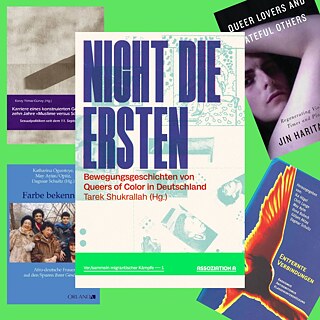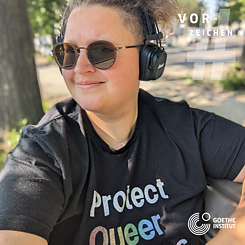Book review #12
Charlott reads 'Nicht die Ersten'
Experiences of discrimination (can) feel isolating. But Tarek Shukrallah’s collected volume, Nicht die Ersten—Bewegungsgeschichten von Queers of Color in Deutschland [Not the First: Stories of the Movement by Queers of Color in Germany], demonstrates that we’re not alone. Charlott’s new contribution to #Vorzeichen reviews this collection.
In my previous discussion of the book Gedichte einer schönen Frau [Poems of a Pretty Lady], I had expressed my thoughts about focusing on (alleged) “firsts” (for example, the first published Black authors)—and then I quite serendipitously encountered the new collection edited by Tarek Shukrallah with the title Nicht die Ersten [Not the First].
Immediately in the introduction, Shukrallah makes explicit that it is not about positioning oneself as the “first” to, for example, organize or document queer struggles: “This project is not the first attempt to remember the struggles of queer Black people and People of Color, migrant Queers. Quite the opposite: The history made by so many others, the paths they’ve trodden, and the stories told about their struggles made this project possible. Although subsequent generations have often sat in the “nest made by” their predecessors, innovators, elders, role models, and comrades, they have also frequently seen themselves as the first to grapple with particular arguments, contend for spaces, develop new forms of expression, and forge alliances. The violence out of which exploitation and discrimination arise is isolating.”
This important collection centers the reports of contemporaneous witnesses, reflecting on diverse forms of activism from the 1980s through today. Each individual text provides insight on specific experiences and perspectives, including the genesis of GLADT or the event series Gayhane, encounters with majority white LGBT organizations, friendships, and conversations around the kitchen table. This collection is also about how the history of activism is and can be remembered and carried on, and about the violence of queer archives in which the stories of BIPoC are reduced to footnotes.
Nicht die Ersten is an intervention into such archival practices. But it is also an independent work filled with invaluable material, food for thought, and reflections. This is a book I will continue to return to.



